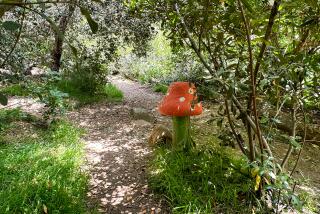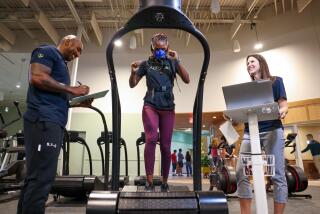Health and healing in a new VA rose garden
It was a crisp, sunny morning when Stephen LeRoy, 53, wandered into the new garden at the West Los Angeles Veterans Affairs campus with a playful Akita named Yuki.
“I love it here,” said the retired Army specialist, who participates in a transitional program for troubled vets. “It’s a nice, peaceful surrounding.”
That sentiment was just what the doctor ordered.
The Historic Women Veterans Rose Garden, just north of Wilshire Boulevard, was created by the nonprofit Veterans Park Conservancy in partnership with the U.S. Department of Veterans Affairs’ West L.A. campus. The aim of the 18-month, $1.1-million project was to provide a healing space where veterans could stroll outdoors among fragrant plants and burbling fountains.
At an opening ceremony last week, VA Greater Los Angeles Healthcare System officials said they planned to use the garden as part of a new “integrative health and healing center” that would incorporate tai chi, yoga and meditation along with Western medicine and therapies. Construction is slated to begin early next year in Building 220 at the garden’s northern end. The center, one of four pilot programs at VA campuses across the country, will include space for classes, video training for future instructors and rooms to accommodate acupuncture and chiropractic treatments. In good weather, tai chi and yoga sessions would also be held in the rose garden.
“Patients say these therapies have lessened their pain and their need for narcotics,” said system director Donna M. Beiter.
One convert to the East-meets-West approach is Thomas Sells, 66, who sustained shrapnel wounds in Vietnam and has suffered from knee and neck pain and post-traumatic stress disorder. Thanks to a regular regimen of tai chi, he thinks less these days about scalpels and pain pills and more about yin and yang.
That’s the ancient Chinese concept of yin and yang, the body’s opposing but complementary forces, which form the basis of the martial art known as tai chi. Since starting tai chi and acupuncture, Sells said he walks better and has better balance. He has put off surgery on both of his arthritic big toes and surgery to replace neck vertebrae with a titanium rod.
“Tai chi has become my primary pain relief,” Sells said after a recent workout with tai chi master Peter Asco. “I give thanks to my tai chi master, who has healed my body inside and out.”
Asco, who has taught tai chi for 25 years, said VA medical officials have increasingly realized that tai chi and qi gong, a complementary practice that focuses on breathing and creating internal stillness, can reduce stress and improve health. “Pretty soon they find their lives again and become active,” he said of participating vets. Asco now works with about 70 veterans on campus, with more expected once the integrative center is up and running.
Lori Bennett, 53, who served in the Army from 1978 to 1982, said qi gong and tai chi have helped her manage pain from brain and spinal damage.
The scent of lemon trees is just one soothing aspect of the garden. Red and white roses, grassy areas surrounded by mud-colored adobe walls and the Heroes Walk lined with paperbark trees provide a calm backdrop. The rose garden was originally installed not long after World War II to honor female veterans. Over the years, neglect laid waste to plants and grass, and weeds sprouted in the brick wishing well. The well and a small 1947 building to honor female veterans have now been restored.
The conservancy was formed in 1986 to help protect the 388-acre campus from commercialization. In 1994, the group opposed efforts to develop a football stadium at the campus. In 2007, the VA Greater Los Angeles Healthcare System agreed to award 16 acres at Wilshire and San Vicente boulevards, including the three-quarter-acre former rose garden, rent-free to the group for a park.
The group has raised millions of dollars from foundations and contributors including investor Peter Mullin and his wife, Merle; former Northrop Chief Executive Thomas V. Jones and his wife, Ruth; and Eli and Edythe Broad. It has installed fencing at the VA campus and the nearby National Cemetery and plans eventually to create the Los Angeles National Veterans Park, with a running track, an amphitheater and volleyball courts.
Not everyone is enamored of the effort. Robert Rosebrock, a veteran activist who attended the garden opening, said the federal government, not private citizens, should take responsibility for upgrading the VA campus. He added that money would be better spent providing housing and supportive services for the thousands of homeless veterans on the streets of Los Angeles County.
More to Read
Sign up for Essential California
The most important California stories and recommendations in your inbox every morning.
You may occasionally receive promotional content from the Los Angeles Times.











